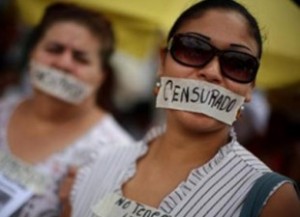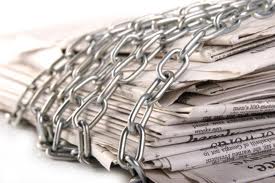Costa Rica News – This has got to be some sort of joke, right? The hypocrisy in Costa Rica knows absolutely no bounds. Although Costa Rica states that it has freedom of press this as all of the newspapers out there know is highly restricted, including laws that were passed just recently.
 First lets talk about the conference. World Press Freedom Day is a global event celebrated each year on 3 May in over 100 different countries but with a main celebration taking place in a specific one.
First lets talk about the conference. World Press Freedom Day is a global event celebrated each year on 3 May in over 100 different countries but with a main celebration taking place in a specific one.
Costa Rica will host the main event, organized by UNESCO for the 2013 celebrations of World Press Freedom Day, from the 2nd to the 4th of May. The decision was announced by the President of Republic of Costa Rica Laura Chinchilla, who stressed her country’s commitment to defending freedom of expression and press freedom.
“Press freedom is a fundamental human right.” the Director-General of UNESCO said. “A high visibility event such as World Press Freedom Day will help highlight the achievements made by Costa Rica and by the whole of Latin America in this area and will signal their firm commitment to freedom of expression and press freedom”.
Now lets tell the real story about freedom of press in Costa Rica as I have been threatened lawsuits for publishing the truth several times and was told by others in the industry just to take the articles down as the legal system and laws favor those who make a complaint about the press and even though it can be true you will spend 1000’s of dollars in the legal system in Costa Rica.
In June 2001, for example, the Costa Rican Supreme Court upheld a libel verdict against three journalists from La Nación. The case stemmed from a 1997 article reporting that a former justice minister had been accused of appropriating state-owned weapons and an official car for his personal use. The politician was awarded damages of US$34,000. The decision also required that La Nación publish the first seven pages of the decision in their entirety. One of the arguments used to justify such a large fine was that the articles were available on the Internet, and therefore reached a larger audience for a longer period of time. The court also ordered La Nación to remove all links from its web site that could lead the reader to the contested articles. The judges ruled that the journalist had shown malicious intent by continuing to investigate the case despite testimony from two former Costa Rican presidents who vouched for the politician’s integrity.
While little outright censorship exists, reports that journalists and editors are forced to monitor what they write and  publish have been increasingly frequent. Editors say they censor themselves and their reporters routinely, for fear of incurring penalties that could mean imprisonment, loss of their jobs, or corporate bankruptcy. A survey done by La Nación which asked journalists a number of questions about their profession showed that many of them practiced some sort of self-censorship. Limiting access to information can be seen as a subtle form of information control and a number of journalists complained that public officials were not forthcoming in this regard. For example, a majority of the journalists interviewed said that while they had direct access to public officials, there were many ways in which these sources avoided their attempts to interview them. Often, it was difficult for journalists to make it through the “screen” of intermediaries (press secretaries, secretaries, assistants, and others). If an interview was obtained journalists complained that public officials pled ignorance or claimed confidentiality agreements prohibited an answer.
publish have been increasingly frequent. Editors say they censor themselves and their reporters routinely, for fear of incurring penalties that could mean imprisonment, loss of their jobs, or corporate bankruptcy. A survey done by La Nación which asked journalists a number of questions about their profession showed that many of them practiced some sort of self-censorship. Limiting access to information can be seen as a subtle form of information control and a number of journalists complained that public officials were not forthcoming in this regard. For example, a majority of the journalists interviewed said that while they had direct access to public officials, there were many ways in which these sources avoided their attempts to interview them. Often, it was difficult for journalists to make it through the “screen” of intermediaries (press secretaries, secretaries, assistants, and others). If an interview was obtained journalists complained that public officials pled ignorance or claimed confidentiality agreements prohibited an answer.
Lets no forget a controversial new law passed just last year that restricts the country’s freedom of press. The law makes it illegal to publish sensitive government information. The new media law, Law 9048 or Information Crimes Law, the law restricts free flow of information and violates freedom of speech. Under the new law any journalist, newspaper or blogger can be prosecuted for publishing classified information. Article 288 of the law gives jail time of up to 10 years for anyone who publishes confidential political information. The law also restricts internet freedom by changing the definition of espionage to include digital information. People who impersonate others online, which could include avatars and aliases, could face up to 6 years in prison. The new law makes it illegal to spread false news over the internet, similar to a Guatemalan law which put a Twitter user in jail for spreading rumors. The Information of Crimes Law restricts freedom of speech in a country that once prided itself on protection of rights.
This new law has even dubbed the new law the “Gag Law,” saying that it protects corruption. The law restricts freedom of press during a time of several corruption scandals. The press has formerly exposed corruption cases, including three involving former presidents. The public has a right to know about corruption happening in their country.
So way to go UNESCO. Way to nominate a country to host this conference that has repeatedly shown that they will restrict the press to make sure they get away with corruption and scandals. Maybe next year they can have the save a shark conference and host it in Puntarenas, the capital of shark finning in Central America.

